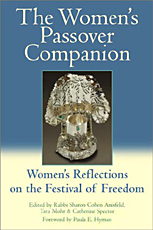The first feminist seder took place in New York City in 1976. In the years since, this Passover ritual has been one of the mainstays of the Jewish women's movement . . . one of the signs of an emerging Jewish women's movement. The opening section of this helpful resource explains this phenomenon with essays on the many meanings of the ritual, memory and gender, the embrace of tradition, and the dance of freedom. The second contains personal reflections on preparing the home for Passover. One piece covers the significance of the orange on the seder plate and another of setting a cup for Miriam. This is followed by sections on women of Exodus (the themes of oppression and liberation), contemporary stories, and challenges for the future.
The diversity of voices in the Jewish women's movement is evident here in pieces by feminist Letty Cottin Pogrebin, theologian Judith Plaskow, and rabbis Sharon Cohen Anisfeld and Sandy Eisenberg Sasso, and many others.
